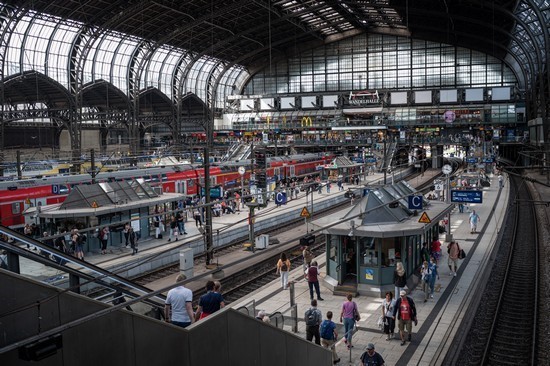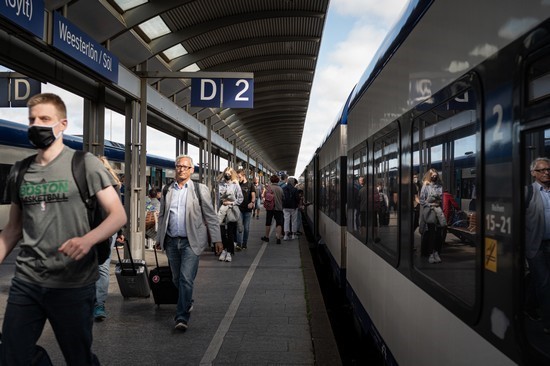Bärbel Hell, who does not usually ride on
trains, was delighted to discover that the lumbering blue-and-white regional
she had boarded one early afternoon was not too packed.
اضافة اعلان
Even though it was summer, and even though the line
she was on connects Germany’s second-largest city,
Hamburg, with the country’s
most exclusive resort destination, the island of Sylt, the coach was not
overcrowded.
“It was easy — we found these seats right away,” she
said.
Hell, returning home from a July shopping trip to
Hamburg with friends, had been bracing for much worse — not only because of
vacation season, but also because of a special pricing program from Germany’s
national rail service that many here had been skeptical of.

Through the end of August, in a bid to help offset
the inflationary pressures on so many of life’s other essential items,
especially energy, the government is subsidizing all-you-can-ride monthly rail
tickets for only 9 euros, or about $9.30.
“I think it helps a lot,” said Hell, 67, a retiree.
“It gives people the chance to get away — because who can afford that with gas
prices these days?”

For all of the appeal of the low price, many
German train regulars, who have long had to deal with delayed or canceled trips and
overcrowded cars, were dreading the expected effect of the promotion.
While it promised to make train travel much more
affordable — putting hundreds of euros back in the pockets of regular commuters
— it also loomed as a burden that could break a system already at its limit.

Before the tickets were even valid, the country’s
tabloids were predicting “9 euro chaos” in their headlines.
But the result so far, 10 weeks into the experiment,
has been something in rare supply in recent days: a mildly pleasant surprise.
Despite the fact that about a full quarter of
Germany’s population bought tickets during the first month of the promotion,
the passenger surge has turned out to be less problematic than many anticipated.

Instead, the offer, despite an occasional
overcrowded train, has become popular. A recent poll conducted for Der Spiegel,
a German newsmagazine, found 55 percent of all Germans in favor of extending
the program, with 34 percent against.
“This is one of the greatest things that Germany has
thought about in recent years — I would almost say decades,” Felix Lobrecht, a
well-known German comic and social observer, who by his own admission prefers
his Mercedes to trains, said on a recent podcast.

Still, regulars on the train from Hamburg to
Westerland, the main town on Sylt, were not ready to declare the plan an
unqualified success, nor were they in a mood to forgive some of the past
transgressions of Germany’s train network.
“You saw a definite increase in travelers,” Matthias
Carstensen, 27, said on his way to his job at the only
McDonald’s on Sylt,
which sits in the North Sea about 6.4km off the mainland, to which it is
connected by a rail causeway.
But Carstensen, who has been commuting to work at
various jobs on the island for a decade, said the bigger problem was the many
delays that had plagued the system even before the introduction of the ticket.
“Recently, it’s been really bad,” he said.
Over the past couple of years, the number of trains
that have arrived on time has plummeted. While it was nearly 90 percent in
2020, now fewer than two-thirds of the trains pull into stations on time. The
number of trains that are canceled altogether has increased, too.

The biggest shares of the blame lie with aging infrastructure
and rising demand. Even before the summer promotion, the 3,000km of tracks most
used by passenger trains were running at 125 percent capacity.
The 9 euro
ticket — courtesy of a 2.5 billion euro federal subsidy — was meant as a
response to sharply rising energy costs caused in part by Russia’s invasion of
Ukraine. But despite its temporary nature, the ticket promotion has become part
of a larger discussion about how to make German society more sustainable and
less dependent on Russian oil, through policies including encouraging the use
of public transportation.
“It’s the first,
and maybe only, measure in this energy crisis that has been categorically
accepted,” said Luisa Neubauer, one of Germany’s best-known climate activists,
noting that the measure helps people from different socioeconomic backgrounds
more equitably than subsidies on gas or heating do. “It’s been a huge success.”
Modern German
passenger trains generally belong to one of two service tiers.
The high-speed
network that the country started expanding in the 1990s connects major cities
that, by German standards, are far apart. Travelers can pay as much as an
airline ticket for the service, but perks include an onboard restaurant,
reclinable seats, and internet. When these trains deliver as promised, they can
make the trip from Berlin to Munich — about the same distance as New York to
Montreal — in under four hours.
The workhorses
of Germany’s rail system, however, are the more bare-bones regional trains.
Like the six-car
Sylt-bound train rambling amid the flat wheat fields and wind turbines at a
maximum speed of 100km/h, they cover routes of up to several hundred
kilometers, connecting neighboring cities or urban zones with their surrounding
suburbs. These are the trains that — together with urban public transportation
— can be used anywhere at any time for 9 euros a month this summer.
(A traveler
willing to make a number of connections, and endure a large number of stops,
could cross the entire country on the 9 euro ticket.)
Pamela Seelbach,
38, who was having one last cigarette before boarding the train in Hamburg for
the three-hour trip to Sylt, said she saved about 80 euros a month with the
ticket just on everyday trips in and out of the city. The money, she said, made
a big difference in her four-member family’s budget.
But what
Seelbach has most enjoyed about the new ticket, she said, is that fact that her
entire family can now take an out-of-town day trip. “It’s something that we
would not ordinarily do,” she said.
Olaf Bösch, a
native of Sylt, said that while he was against the low ticket price in general
— “It’s just too cheap — it’s practically free,” he said — he had experienced
an unexpected benefit. Like most employers on Sylt, Bösch pays the train costs
for workers as a perk. So the three-month program has cut his costs.
At least one
group of train employees, conductors, has identified a real benefit from the
promotion. Because it is now so rare for somebody to use the train without
paying, many conductors have stopped checking for tickets.
“We don’t have
to deal with fare dodgers anymore,” said one conductor on the
Hamburg-Westerland line, who asked not to be identified because he was not
allowed to speak to the news media. “Apparently everyone has 9 euros to spare.”
Read more Travel
Jordan News



